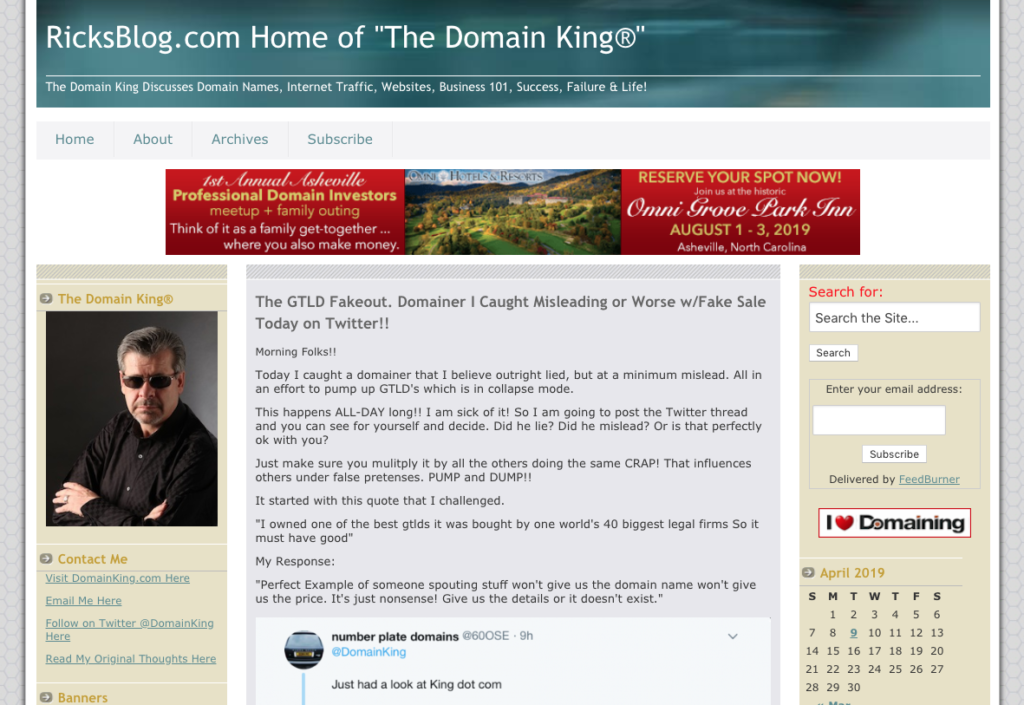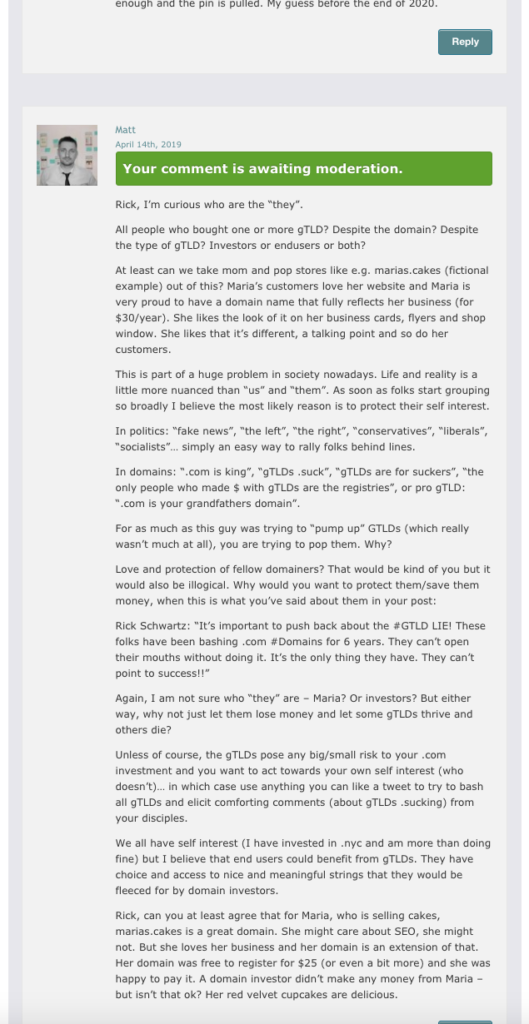Rick Schwartz .scared or .caring?

For readers who do not know Rick Schwartz, he is an early .com domain investor. He started trading adult related 800 numbers and moved into adult related .coms and made millions from premium generic, keyword .com domains.
He was in the right place at the right time and had the experience and skill to seize the opportunity to profit from buying .com domains, holding them for a long time and waiting for the perfect end user to come knocking and buy the domain for top dollar. On his website ricksblog.com he mentions that he has only ever sold 35 of his 6500 domain names, which may give him 6,465 reasons why he is so strongly against new gTLDs – more on this later.
Let me start from the gTLD beginning.
Back in 2014 many new domain extensions were launched, some being geoTLDs (.nyc, .paris, .london), some were generic keyword gTLDs (.toys, .city, .photography) and in some cases businesses launched their own for private use (.bmw, .neustar, barclays).
This was a big change to the internet. There were opportunities and risks to domain investors as well as to businesses and individuals who were looking for more choices in the domain name they were to build a website on.
Over time, blogs and forums became filled with .com investors either taking a position in the new TLDs, sitting quietly and watching how things played out, or attacking the new gTLD program and the 1000+ new domain extensions.
Since that time, there have been challenges to the new gTLD program: confusing premium pricing, sometimes escalating renewal costs, mergers of registries, similar and competing domain extensions (e.g. .photo, .photos, .photography), even a lack of understanding of how to spread awareness of the new gTLDs and how search engines will ultimately rank sites built on them (favorably or not).

Full disclosure of my own self-interests and biases
I invest in .nyc domain names, I have sold many making a reasonable return (while I pay for the renewals of held domains) and I also believe that the .nyc domainspace is being managed extremely well by Neustar and the City of New York. For .nyc there are nexus requirements whereby domain registrants must live or work in the City of New York, and there is a profit sharing agreement between Neustar and the City (60:40).
I believe that of all of the new gTLDs, city/geoTLDs have the greatest potential for end users and domain investors.
Some .boston domains are in my portfolio too, but my sense is that the .boston registry doesn’t care too much about its success and the City of Boston is not involved in the .boston domainspace which is a shame. .NYC is the opposite and is a great model that all cityTLDs should look towards.
As for non-geoTLDs, like .shoes, .pics, .toys, I see almost zero opportunity for domain investors but choices and options for businesses and individuals to get a perfect fit, meaningful domain name that matches their brand. Sure it’ll be unusual at first, and there are challenges with awareness including comments from customers, “Is marias.cakes really a website?” but I believe that these name options are important as the supply of good .coms dwindles and mom and pop shops cannot afford the high prices .com investors are demanding.

Why am I writing about Rick Schwartz?
Last week Rick wrote an article again which showed his disapproval of the new gTLD program and in this case he used a tweet thread where someone was hyping the value of gTLDs to bash the entire program. I read the article this morning and the content and comments were full of comments criticizing folks who bought into new gTLDs as .suckers.
This wordsmanship takes me back to those heated threads on domain name forums where people got in line, on one side or the other, to beat on .coms (as the old fashioned internet and new gTLDs as the way forward) or to beat on “people wasting their money on new gTLDs should dump them all”.
The tone of the comments and the article itself groups all gTLDs as a terrible waste of money, but fails to separate the types of domains being registered and the type of registrants (investors, end users). Yet there are important differences that should be considered.
These type of articles often fail to provide any beneficial reason for new domain extensions, so I left a comment. The comment went into “awaiting moderation” state, then it disappeared, and then reappeared as published on the website.
It was when I noticed my comment had disappeared that I got to writing this article. I spent a while typing it and I wondered why Rick would remove my comment. I was halfway through writing it when I noticed my comment had reappeared on his website and so it really could have been a caching issue with my browser and nothing more sinister!
As my article was in full motion I decided to continue it and also to post my comment below. I encourage you to read Rick’s article here and take a look at the comment section.

Do you agree with Rick? Are you against all new gTLDs? Do you think Maria is wise to register and use marias.cakes? Are red velvet cupcakes the best? Almost no comments will be deleted.